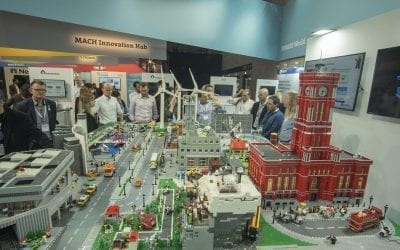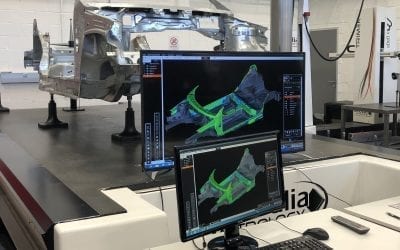It is exciting to see all the work being undertaken by startups using the FIWARE platform to disrupt the agribusiness industry and harness technology as an enabler for reorganizing our food systems, from the farm to the plate and to our waste disposal processes.
There is perhaps no more vital area where we need to be working. We have previously talked about some of the amazing work being done top ensure we have a food supply for our expanding population. Hostabee, for example, looks at one of the most hidden but essential parts of our food system: bee health. Without bees, much of the diversity in our food supply would vanish almost overnight: many fruits, avocados, and onions rely on bees for pollination, so without a bee population, our diets would lose a lot of nutritional potential.
But there are other great inefficiencies in our current agricultural and food supply systems. From high water usage in our agriculture systems, which must be more rationally managed in the future to compete with other water needs, to growing pest risks. We often focus on the inefficiencies of the production and distribution components of our food systems.
There are also opportunities to improve how we consume and manage food waste. In part one of our look at how FIWARE is being adopted by agribusinesses, we looked at FIWARE’s use amongst businesses that are targeting food production and the transport and distribution of our food to our urban centres.
In part one, we looked at how FIWARE is supporting agribusiness toi more sustainably farm and distribute our food. Now let’s look at some of the projects that address how FIWARE is supporting our food consumption and food waste management.
Food consumption
QIFresh: While Greek startup QIFresh could also be considered a food distribution agribusiness, its main goal is to ensure healthy consumption of our foods by tracking and managing the quality of our food stuffs from supplier to retailer and into the home or restaurant. Using the FIWARE platform and generic enabler tools, QIFresh helps speed up and manage food and produce inspections and reduce errors, ensuring a higher level of safety for our food consumption.
Turn2bio: Turn2bio makes it possible for consumers to buy organic food directly from organic farmers. Using FIWARE to create an online platform, turn2bio goes beyond just a marketplace for organic food (although it offers that as well) to include healthy eating facts and advice and a rich library which could include recipes and encouragement for a healthy food diet.
Food waste management
SUR+: While we covered the Dutch startup SUR+ as an interesting food distribution model that connects farmers to charity food banks so that surplus food — often simply fresh produce that does not conform to supermarket standards of shape and size — can be consumed by communities, families and households who need it the most. But behind this distribution model is an even greater role that the startup is playing in reducing our food waste. SUR+ says that around one-third of all fresh food in The Netherlands is wasted.
Doing more in food waste management: There are also a range of opportunities in addressing food waste through better management of our urban disposal systems and organic waste collections, and in converting bio-organic waste to fuels. As use of the FIWARE platform grows amongst agribusiness, we are excited to see how it will be used to address all aspects of the food system.
There are over 100 agribusiness startups in the FIWARE ecosystem currently working on various aspects of the food supply and consumption chain. Smart technology will become an essential tool that enables our farming practices to maintain crop yield and better distribute produce to our urban centres. It will drive innovation in our consumption patterns and will increasingly be drawn upon to help educate and make healthy food more easily accessible. And smart technology will reduce our food waste, and better recycle what we cannot eat.



